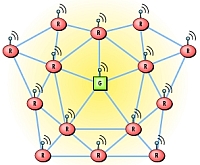While I am wondering about the technology, and agree with Engadget that the Meraki Mini will be the OLPC wireless mesh card, Phillip over at Brantickle: Interface Design is wondering about the social side of mesh networking.
Let's say that OLPC laptops someday can mesh with their neighbours, and leap tall mountains to connect to Internet backhauls, what about the communities? To quote Phillip:
So what if the kids in the next village don't keep their laptops cranked, and you end up losing the link? This can either lead to the mesh collapsing over time (because if I've little hope of getting a link, I won't crank my machine) or to conflict between villages. Not that learning conflict resolution is a bad thing, but this should be addressed by the organisers when the laptops are introduced.While I was familiar with the idea of critical mass, the need to have a great number of users on a system to maintain its momentum and use within a community, I didn't think of a community using its position upstream to extract concessions from users downstream. Then again, I've never lived in a limited water environment.
In the developing world, communities would be quick to make the mental leap of water to Internet. While I can see the OLPC backers talking about nationwide mesh, so one community would not have such leverage, at the edge of the "mesh cloud" there would always be an outlying community.
OLPC is even targeted for such outlying communities. And now there would be a new resource they could limit access to for their own gain. Water wars are ancient. Will OLPC create Internet wars?
KEYWORDS:
Mesh Networking | OLPC | Critical Mass | Mesh Cloud


